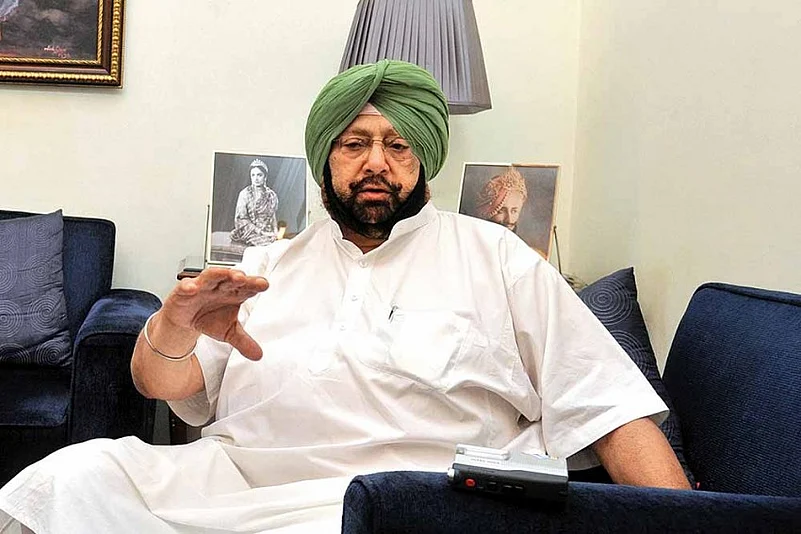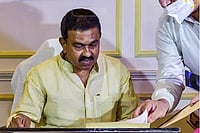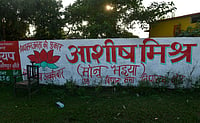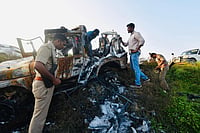Ever since 20 Indian Army soldiers were killed in a fierce clash during a face-off with Chinese army in Galwan Valley, the Congress party has been accusing the BJP-led government of 'policy blunder', saying the deaths were avoidable. The party has also been seeking answers from the Centre on the events that led to the Galwan Valley clashes. While the BJP, in its response, has slammed the Congress for asking questions about Galwan Valley incident, Punjab Chief Minister and senior party leader, Amarinder Singh tells Outlook’s Bhavna Vij-Aurora in an exclusive interview that his party stands with the government and with the Indian Army, but it will continue to ask questions since it is their responsibility.
As one of the most senior leaders of the Congress, a successful administrator, former Army officer and a historian, how do you explain what happened at Galwan?
We made the mistake of trusting the Chinese and then compounded it by allowing our men to go out to face them with their hands literally tied behind their backs. Galwan was a totally avoidable tragedy. We could have saved those 20 precious lives had we not made these two big mistakes. The Chinese are just not trustworthy, as we have seen before. This Hindi-Cheeni Bhai Bhai sloganeering is just a farce, and China has never seriously meant it. Their territorial ambitions are known to the world, and are evident in their actions on land, sea, and in the air, along every border of that country. The Chinese Army has transgressed into Indian territory many times between 2016 and 2018. Considering this, I fail to understand how and why our soldiers were allowed to face the Chinese without weapons. I cannot believe that they were carrying weapons, as is being claimed now, and did not use them even after their commanding officer fell to the Chinese treachery. But if that was the case, then there was definitely a policy blunder which cost us dearly.
Was the Indian Army caught unawares about the Chinese strategy, lulled in the belief that the PLA soldiers had withdrawn?
I do not think the Indian Army thought that the PLA soldiers had withdrawn. In fact, what I understand is that the team led by Colonel Santosh Babu had gone to check if the Chinese side was sticking to its part of the agreement to withdraw from that area, and to ensure that they did. That is when he and his men were attacked by the lathi-wielding, stone-throwing barbarians. The whole thing was a trap, a well-laid ambush. If there was a failure, it was that of intelligence, not of the soldiers on the ground.
India retaliated Uri terror attack with surgical strikes and Balakot by an air attack. In Uri, 19 soldiers were killed. Here the number of fatalities is 20. Do you think Indian response to China is different because of power differentials between the two in terms of the army and weaponry?
Firstly, let us not make it a number game. Every soldier’s life counts and even a single man’s death, especially when it happens in such circumstances, is a deep loss for the nation. And secondly, there is no power differential. The Indian Army is as powerful, if not more, than the Chinese. Our soldiers are trained and equipped to give them a befitting response. The difference is in the tactics of the Chinese versus those of the Pakistanis. The Chinese are masters of deceit, of pretension. Our mistake is that we allow ourselves to be lulled into the belief that they are sincere in their overtures of friendship. In the guise of friendship, they sneak into our territory. With Pakistan we have had an undeclared war since 1947.
Having said that, I personally believe that our response to China has to be as strong as it has been to Pakistan, whether it was Uri or Balakot. We cannot let the sacrifice of our men go waste, and we cannot allow it to happen again. China has to be stopped from pursuing their salami slicing policy of taking our land piece by piece. India’s territorial sanctity is sacrosanct and nobody, be it China or Pakistan, can get away with such transgressions and killings. That message has to go down loud and clear. Through diplomacy, if possible, but for those who do not understand the language of diplomacy then through strong actions, as happened in Uri and Balakot. I have always said, they take one of ours, we should take five of theirs.
Do you think it is also because of the power that China wields in the world as an economic superpower?
I don’t think economic considerations are or can be a factor in deciding the course of action. The nation’s sovereignty and integrity outweigh all concerns. That is the bottom rule of our relationship with any country. There is no question of allowing economic factors to come in the way of our decisions when it comes to protecting the country. It’s just that nobody wants war. That holds true even today, in the aftermath of the Galwan Valley incident. But that does not mean that we are going to be cowed down by China or anyone else. That is the message we need to give them. And if they don’t understand dialogue then let it be bullets.
How do you react to the call for boycotting everything Chinese?
Economic sanctions and boycotts are a peacetime act. These are things one does when it’s business as usual. The Chinese have shown it is not peacetime at the LAC. Whatever response has to be there, it has to be at the border first, in their language. Anything else can come later.
Do you think the government has not handled the Chinese crisis adeptly with people speaking in different voices?
This smacks of confusion in the government policy on the issue of China, which is a matter of serious concern. At a time when every Indian and every political party, including the Congress, have made it clear that they stand with the Government of India on the issue, lack of unity within the government only shows that either there is a policy vacuum or there is an attempt to hide things. Either way it’s not good for the nation. The people have the right to know what happened and why it happened. Every soldier wants to know. I, as an Indian and an ex-soldier, want to know why we let our men fall prey to the Chinese evil machinations.
What would your advice be to the government on dealing with the Galwan standoff?
Stand up to the Chinese is what I would like to see the government do. Don’t let them get away with this horrendous assault on our soldiers and our territory. Any sign of weakness would be suicidal to our national interests. It was our display of weakness in the first place that encouraged them to go this far – kill our men after agreeing on de-escalation. Stop trusting them, and make it clear to them that while we are not interested in war, we are not letting anyone get away with treating us as weaklings and treating our soldiers as easy prey. Give the soldiers at the LAC the right and the freedom to protect themselves. Leave it to the Army to tackle Chinese incursions and attacks at the border. They know how to do it, they are trained to do it. Just give them the weapons and tell them to handle the Chinese the way they deem best. And let me tell you, our men are not irresponsible thugs like the Chinese. They are a disciplined force and know when and how to act or react in any situation. Better than any policymaker sitting in Delhi.
Do you foresee a repeat of the 1962 situation?
Out of the question. Our Army then was a shadow of what it is today. It is much bigger and better equipped than it was then. We learnt its lessons the hard way in 1962, and those lessons have made us a much stronger force, capable of defeating anyone in war. We may not want war, but if it comes to that, with China or anyone else, then we are more than ready for it. We are ready and geared to fight and defeat any enemy.
The govt has been criticising the Congress party for raising questions about the intrusion, calling it anti-national. What do you think should be the role of a responsible Opposition at such a time?
There is no question of the Congress being anti-national. It’s an over 100-year-old party that has made huge sacrifices in the interest of the nation and does not need a certificate from anyone to prove its nationalism. Asking questions is every party’s right. In fact, in a democracy, it is every individual’s right. And when you have lost 20 brave men in a senseless act of violence by the Chinese, how can the Congress or anyone not be affected? How can we not ask questions? Did the BJP not ask questions to the government of the day when it was in the opposition? Did that make it anti-national? In fact, any responsible Opposition will ask questions.
Sonia Gandhi has clearly stated that the Congress sands with the government, and with the Indian Army, at this hour. But we are responsible to the people of this country, and they want answers. We are responsible to those men out there in the mountains, thousands of miles away from their homes, putting their lives on the line for every Indian. And for them, we shall continue to ask questions. It is the responsibility of the government to answer all those questions, except where those responses can compromise the security of the nation, which is definitely not the case here. On the contrary, the security of the country has already been compromised by the Chinese act, and it is our right to know why it happened and what the government is doing to ensure that it does not happen again.
Lastly, do you think the way the government has managed the migrant crisis, Covid-19 and now this, the tide is turning for the Narendra Modi government after six years in office?
Things could definitely have been handled better on all these fronts. The migrant crisis could have been averted had the lockdown been planned better. I had warned in March itself that the migrants stranded in various states could be a big problem and something needed to be done about it. But the government did not pay heed. They did not listen when Rahul Gandhi warned in February of the impending Covid crisis. Had we started preparing early we might have been able to minimise the impact of the pandemic. A government that does not listen to the opposition or to its people usually ends up having to pay the price for it. People are bound to get disillusioned; they are sure to feel let down at some point.





















.jpg?w=200&auto=format%2Ccompress&fit=max)




